
La Guma, Alex
1925–1985 South African writer Alex la Guma was a South African writer of mixed race. His novels portray the experiences of nonwhites living under APARTHEID, the policy of racial segregation followed in SOUTH AFRICA from 1948 to 1994. The son of a well-known trade union leader in CAPE TOWN, la Guma became politically active at an early age. When […]
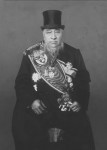
Kruger, Paul
1825–1904 South African political leader Paul Kruger led the Dutch AFRIKANER REPUBLICS in their war against British control in the late 1800s and early 1900s. Kruger was born in Cape Colony in what is now SOUTH AFRICA. When the British tried to take over the region, his family fled in what became known as the Great Trek—the migration of […]
Kourouma, Ahmadou
1927–2003 African novelist Ahmadou Kourouma, a celebrated writer, is the author of two of the most famous African novels in French. In his work he criticizes postcolonial governments and one-party political systems. He also describes the despair felt by many Africans when independence failed to fulfill their expectations. These themes have appeared in many works written by French-speaking Africans. Born […]
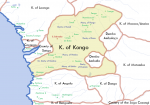
Kongo
Kongo was the name of a west-central African kingdom that emerged in the late 1400s and eventually became part of the Portuguese colony of ANGOLA. Kongo was initially a federation of several small states, whose people elected its king. Over time the kings concentrated power and resources in the capital at Mbanza Kongo and established a more centralized government. They […]
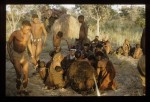
Kinship
Kinship is the web of relationships woven by family and marriage. Traditional relations of kinship have affected the lives of African people and ethnic groups by determining what land they could farm, whom they could marry, and their status in their communities. Although different cultures have recognized various kinds of kinship, traditional kinship generally means much more than blood ties […]
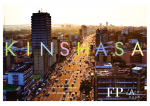
Kinshasa
Located on the CONGO RIVER, Kinshasa is the capital and largest city of the Democratic Republic of CONGO. Stone tools found in the area indicate that the site has been inhabited since the 7000s B.C. When the explorer Henry Morton STANLEY arrived in the region in the 1880s, Kinshasa was a small fishing village. Stanley signed a treaty with […]
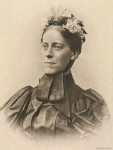
Kingsley, Mary Henrietta
1862–1900 British traveler While growing up in London, Mary Kingsley followed her father's travels around the world with great interest. His adventures and her own reading fueled her desire to explore the globe herself. After both parents died in 1892, Kingsley decided to travel. In the years between 1893 and 1895 she made two trips to Africa, visiting ANGOLA, the […]
Kings and Kingship
Kings have ruled in Africa at least since the time of the pharaohs, the early Egyptian kings who came to power about 3000 B.C. EGYPT's system of royal rule lasted for nearly 3,000 years. Other kingdoms developed in western North Africa and large areas south of the Sahara desert. Some African kings ruled up to 1 million people, as […]
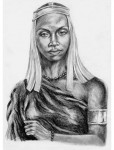
Kimpa Vita
ca. 1686–1706 African religious leader Kampa Vita was a member of the nobility in the west-central African kingdom of KONGO. For a time, she was a nganga, a person who performed certain important rituals. After recovering from an illness, she claimed to have died and returned to life possessed by the spirit of the Christian saint Anthony. Taking the […]
Kimbangu, Simon
ca. 1887–1951 Congolese religious leader Simon Kimbangu was born in the Lower Congo (now CONGO, KINSHASA) and raised as a Baptist. Although not a member of the clergy, he began to preach in British missions in 1918. He also experienced a series of spiritual dreams and visions. In an effort to escape them, he moved to the city of […]
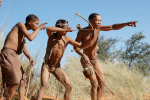
Khoisan
Khoisan is a name often given to the non–BANTU-speaking peoples of southern Africa formerly called Bushmen (or San) and Kxoe (or Khoi). The Khoisan do not have a common culture or ethnic background. Instead they share a unique family of languages, which features the use of “clicks.” Khoisan peoples have inhabited southern Africa for more than 20,000 years. Rock paintings […]
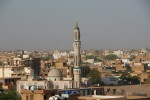
Khartoum
Khartoum is the capital and political and industrial center of SUDAN. Its strategic location at the meeting point of two rivers, the Blue Nile and White Nile, made it a much-contested prize. In 1821 northern Sudan was conquered by the Ottoman Turks. They established an outpost at nearby Omdurman, and set up a military camp at Khartoum. Three years later […]
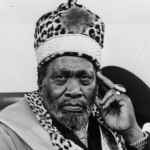
Kenyatta, Jomo
1888 (or 1889)–1978 President of Kenya Jomo Kenyatta, the most important African leader in colonial KENYA, served as the country's first president after independence. A member of the GIKUYU ethnic group, Kenyatta was born Kamauwa Muigai, and later baptized under the name Johnstone. After leaving the Scottish mission school he attended as a youth, he changed his name to Jomo […]
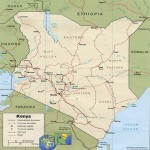
Republic of Kenya
POPULATION: 44.86 million (2014) AREA: 224,960 sq. mi. (582, 646 sq. km) LANGUAGES: English, Swahili (official); Gikuyu, Nandi, Kamba, Luhya, Luo NATIONAL CURRENCY: Kenya shilling PRINCIPAL RELIGIONS: Protestant 38%, Roman Catholic 28%, Traditional 26%, Muslim 7%, Other 1% CITIES: Nairobi (capital), 2,000,000 (1999 est.); Mombasa, Nakuru, Kitale, Nyeri, Kisumu, Thika, Malindi, Kericho ANNUAL RAINFALL: Varies from 29 in. (750 mm) in the highlands […]
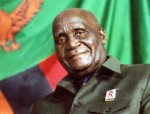
Kaunda, Kenneth
1924– President of Zambia Kenneth Kaunda served as ZAMBIA's first president and became a prominent political leader within Africa. Born in what was then Northern Rhodesia, Kaunda trained as a teacher but became active in politics in the 1950s. He organized the local branch of the African National Congress, the country's first political party, and later served as the party's […]
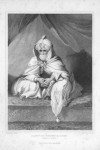
Kanemi, Muhammad al-Amin al-
ca. 1775–ca. 1837 Scholar and ruler of Bornu Muhammad al-Kanemi was born in southwestern LIBYA and received an extensive Muslim education in both Africa and Arabia. He traveled widely, finally settling in the kingdom of BORNU in north central Africa in 1799. There he attracted a large following of scholars. Soon after his arrival, the ruler of Bornu asked for […]
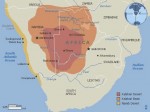
Kalahari Desert
The Kalahari Desert is a large, sandy plain in southern Africa with forested regions in its northern reaches. Really a semidesert or dry savanna rather than a true desert, the Kalahari measures about 1,000 miles from north to south and 600 miles from east to west at its broadest points. About 100,000 KHOISAN people and approximately 1.5 million BANTU-speaking people […]
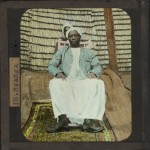
Kagwa, Apolo
ca. 1868–1927 Prime minister of Buganda Apolo Kagwa emerged as the leader of the Christian Party, one of thegroups struggling to control BUGANDA during the religious wars of the late 1800s. From 1889 to 1926, he served as katikiro (prime minister) of the semi-autonomous kingdom of Buganda under British authority. In 1897 Kagwa helped overthrow Buganda's King Mwanga […]
Kadalie, Clements
ca. 1896–1951 South African labor leader Clements Kadalie, an early African labor leader, organized a black union that challenged white rule in SOUTH AFRICA. After graduating from high school in his home country of Nyasaland (now MALAWI), Kadalie traveled through southeastern Africa. He arrived in CAPE TOWN in 1918. That year he founded the Industrial and Commercial Workers Union of […]

Kabarega
ca. 1850–1923 King of Bunyoro-Kitara Kabarega was ruler of the kingdom of Bunyoro-Kitara in what is now the nation of UGANDA. During his reign he expanded the empire and led a determined resistance to British colonization in East Africa. Although some historians consider Kabarega a tyrant and a murderer, others see him as a hero and an early African […]

Judaism in Africa
Judaism in Africa is represented mainly by two separate groups of people: Jews from Europe and the Middle East and indigenous Africans who claim Jewish or Israelite descent. Jews from the Middle East arrived in Africa before A.D. 400, settling mainly in North African countries such as EGYPT and ALGERIA. Most worked as artisans, merchants, or laborers. In the […]
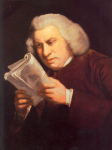
Johnson, Samuel
1846–1901 Yoruba historian Samuel Johnson was the author of the first important history of the YORUBA people. The son of a liberated slave and descendant of African kings, Johnson was born in SIERRA LEONE. At the age of 11, he and his family moved back to Yorubaland in what is now NIGERIA. Educated in schools run by the Church […]

Johannesburg
Johannesburg is the largest city in SOUTH AFRICA. It was renamed Greater Johannesburg in 1994, when its boundaries were extended to include surrounding suburbs. With a population of more than 5 million people, Greater Johannesburg is growing faster than any other major city in Africa. Geography and Peoples Greater Johannesburg is located inland on the Highveld, South Africa's broad central […]

Ivory Trade
For centuries ivory—the material of elephant tusks—was one of the most sought-after luxury items from Africa. A brisk ivory trade developed in ancient times, linking hunters deep within the continent to markets around the world. By the 1980s elephants had been hunted nearly to extinction, and most nations banned the ivory trade. Egyptian records show that Africans were trading […]
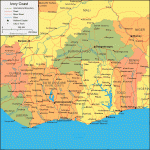
Ivory Coast
POPULATION: 20.80 million (2014) AREA: 124,503 sq. mi. (322,463 sq. km) LANGUAGES: French (official); Dioula (Djula), other native languages NATIONAL CURRENCY: CFA franc PRINCIPAL RELIGIONS: Muslim 60%, Christian 22%, Traditional 18% CITIES: Yamoussoukro (political capital), 120,000 (1999 est.), Abidjan (economic capital), 2,793,000 (1999 est.); Bouake, Man, Gaghoa, Grand-Bassam, Bingerville ANNUAL RAINFALL: Varies from 50–94 in. (1,270–2,413 mm) on the coast to 50–60 in. (1,270–1,542 […]
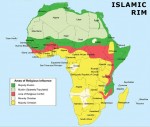
Islam in Africa
The religion of Islam arose in the Arabian city of Mecca around A.D. 610 through the work of its prophet Muhammad. After Muhammad died in 632, his teachings were carried into Africa by Arab traders, settlers, and soldiers. By conversion and conquest, Islam spread across North Africa, into the eastern Horn of Africa, and even over the SAHARA DESERT into […]
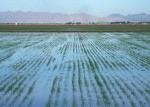
Irrigation and Flood Control
For thousands of years, Africans have sought to manage the flow of water through their landscape. The continent’s unreliable rainfall and frequent droughts make irrigation an essential tool for agriculture. In addition, various rivers flood frequently, and many people live in the floodplains surrounding them. Farmers and engineers have devised a variety of irrigation and flood control systems to make […]
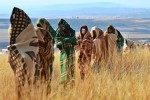
Initiation Rites
Initiation rites are ceremonies performed when people take on a new role in life. In various parts of Africa, such rites may usher individuals into adulthood, secret societies, or positions of leadership. They are one of several types of rites of passage—the ceremonies that mark a person's progress through the stages of life. Initiation rites vary from one society […]

Indian Communities
Although people from India had reached Africa many centuries ago, large groups of Indians did not settle there until the second half of the 1800s. At that time Britain ruled India as well as a number of colonies in Africa. The British presence in both regions made it possible for many Indians to migrate to eastern, central, and southern […]
Independence Movements
Between 1957 and 1993 nearly 50 African states achieved independence from colonial rule. The first sparks of resistance to foreign control took shape much earlier, though, in some cases hundreds of years earlier. Independence movements developed throughout Africa in the mid-1900s. Although they followed different paths, they shared a common beginning: resistance to domination by foreign powers. Unfortunately, once in control, […]
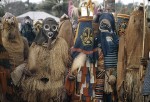
Igbo
The Igbo (or Ibo) are one of the three principal ethnic groups in NIGERIA. Their homeland, Igboland, straddles the NIGER RIVER and covers a territory of some 16,000 square miles. But the Igbo, who number about 20 million, can be found throughout Nigeria, not just around the Niger River. They form one of the largest ethnic groups in Nigeria's Delta […]

Ibn Battuta
1304–ca. 1369 Arab traveler Born in Tangier in Morocco, Abu Abdallah Muhammad ibn Battuta was one of the most widely traveled individuals of the Middle Ages. Trained as a religious lawyer, he set out at the age of 21 on a pilgrimage to the Muslim holy city of Mecca. Before he died he had visited almost the entire Islamic […]
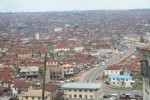
Ibadan
Ibadan, the second largest city in NIGERIA, is located on a group of seven hills in the southwestern part of the country. The city began as a military camp about 1829, and it grew into the most powerful town of the YORUBA people. Unlike other Yoruba settlements, Ibadan had an open society where advancement depended on talent rather than […]
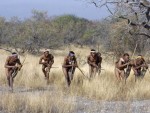
Hunting and Gathering
Hunting and gathering refers to a system of securing food through the hunting of wild game and the gathering of roots or wild plants. Hunting may be an individual or group effort. One person may hunt using a bow and arrow or a simple trap, or a group of people may cooperate by chasing prey into a pit or […]
Hunger and Famine
One of the most enduring modern images of Africa is that of a land plagued by hunger and famine. Pictures of Africans starving during droughts and of hungry REFUGEES fleeing civil war appear in the news media every few years. While hunger and famine are ongoing problems for many Africans, their severity, causes, and solutions are often misunderstood or misrepresented. […]

Humans, Early
In 1871 Charles Darwin, the man who gained fame with his theory of evolution, discussed the origins of humans in a book called Descent of Man. Darwin noted that chimpanzees and gorillas—humans' closest animal relatives—are found only in Africa and suggested that Africa was also the birthplace of the human species. Modern paleoanthropologists—the scientists who study early humans and […]

Human Rights
At the end of the colonial era, each new African nation became responsible for ensuring the human rights of its citizens. Unfortunately, the continent's record since then has been very poor, with widespread abuses ranging from censorship of the press to genocide. By the early 2000s, many international organizations had become involved in promoting human rights in Africa and conditions […]
Houses and Housing
Houses and housing issues in Africa vary dramatically between rural and urban areas. People in most rural areas build houses using long-established methods that suit traditional ways of life. The situation is quite different in the continent's rapidly growing cities. Increases in population density, government regulations, and the diverse lifestyles of city dwellers have combined to create a housing crisis […]
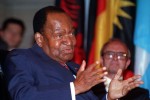
Houphouet-Boigny, Felix
1905–1993 President of Ivory Coast Felix Houphouet-Boigny, who served as president of IVORY COAST for 33 years, was one of the most powerful and influential politicians in Africa. The son of a wealthy Baule chief, he attended French colonial schools and received a degree as an African physician, the highest medical degree an African could obtain under French colonial […]
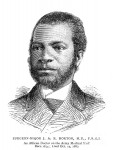
Horton, James Africanus
1835–1883 Sierra Leonean physician James Africanus Beale Horton, an IGBO from West Africa, became a physician and served for 20 years as a medical officer and administrator. He also wrote books on medicine and on the political situation in the region. Born in SIERRA LEONE to a father who had been rescued from a slave ship, Horton grew up […]
History of Africa
Tracing the history of Africa has presented a challenge to historians because of the lack of written records for much of the continent's past. Until recently most information had come from reports of foreign visitors, traders, and invaders over the last several hundred years. Historians of Asia and Europe, by contrast, have been able to use ancient records to construct […]
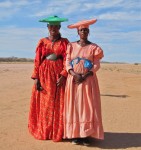
Herero
The Herero are a Bantu-speaking people of southern ANGOLA, NAMIBIA, and BOTSWANA. Their traditional herding society consisted of clans that traced their descent from both female and male ancestors. In the 1840s the Namibian Herero formed alliances with local chiefs, traders, and German missionaries. With the help of their allies, the Herero acquired firearms and increased their power. Eventually, three Herero […]

Health Care
The state of health and health care in Africa is influenced in a dramatic way by the continent's poverty. Hospitals, clinics, trained medical personnel, and needed medicines are all in short supply, and available resources are often too far away or too expensive for the average African. These realities have shaped the organization and functioning of health care systems in […]
Healing and Medicine
African ideas of healing and medicine have been shaped by both indigenous and imported traditions. For thousands of years, African peoples have practiced forms of healing and medicine that involve both natural and supernatural explanations and remedies. The ancient Egyptians developed medical practices that influenced neighboring civilizations, including Greece and Rome. Then Greek and Roman ideas about health and sickness had […]
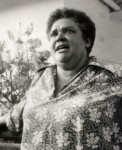
Head, Bessie
1937–1986 Botswanan writer Bessie Head is the author of several novels and short stories about the political and social conditions of African society. She was the illegitimate daughter of a white South African woman and a black stable hand. Head spent most of her childhood in the home of a mixedrace foster family in SOUTH AFRICA. At age 13, […]

Hausa
The Hausa are the largest ethnic group in West Africa. Since ancient times their people have lived in the region between Lake Chad and the Niger River. Hausa kings ruled their states from large, walled cities and established successful trading networks. Today, the largest group of Hausa lives in NIGERIA, but NIGER, CHAD, and GHANA also have Hausa populations. Originally, […]
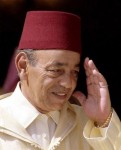
Hassan II
1929–1999 King of Morocco Hassan II, king of MOROCCO from 1961 until his death, was credited with preserving the Moroccan monarchy. During his reign he introduced a number of democratic reforms and tried to build closer ties with the United States and other Western countries. Educated in both Arabic and French, Hassan studied law at the University of Bordeaux […]
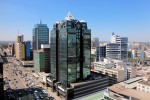
Harare
Harare is the capital and largest city in ZIMBABWE. Founded in 1890 by British colonists, it was originally called Salisbury. After independence in 1980, the city was renamed Harare for Neharare, an important local chieftain who had lived in the area. Situated in a highland region at an elevation of 4,865 feet, Harare has a mild climate. It is […]
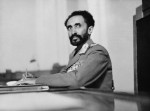
Haile Selassie I
1892–1975 Emperor of Ethiopia The emperor of ETHIOPIA from 1930 to 1974, Haile Selassie I sought to transform Ethiopia into a modern nation. He also hoped that Ethiopia would take a leading role in Africa. Born Lij Tafari Makonnen, Selassie was the son of an adviser to Emperor MENILEK II. The emperor recognized Selassie's abilities and promoted him to […]
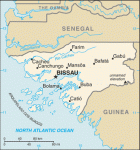
Republic of Guinea-Bissau
POPULATION: 1.801 million (2014) AREA: 13,948 sq. mi. (36,125 sq. km) LANGUAGES: Portuguese (official); Crioulo, Balante, Fula, Malinke NATIONAL CURRENCY: Guinea peso PRINCIPAL RELIGIONS: Traditional 50%, Muslim 45%, Christian 5% CITIES: Bissau (capital), 233,000 (1995 est.); Bafata, Bissora, Bolama, Cacheu, Teixeira Pinto, Farim, Gabu, Mansoa ANNUAL RAINFALL: Varies from 49 in. (1,250 mm) in the northeast to 108 in. (2,750 mm) along the […]
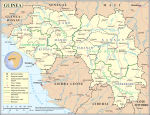
Republic of Guinea
POPULATION: 12.28 million (2014) AREA: 94,925 sq. mi. (245,856 sq. km) LANGUAGES: French (official); many indigenous languages NATIONAL CURRENCY: Guinean franc PRINCIPAL RELIGIONS: Muslim 85%, Christian 8%, Traditional 7% CITIES: Conakry (capital), 1,558,000 (1999 est.); Kankan, Siguiri, Labe, Kindia ANNUAL RAINFALL: Varies from 170 in. (4,300 mm) at the coast to 80 in. (2,000 mm) 125 miles (200 km) inland. ECONOMY: GDP $6.624 […]

Government and Political Systems
The political systems of most African nations are based on forms of government put in place by colonial authorities during the era of European rule. Because these governmental institutions reject the indigenous political systems on which African society was built, they have generally failed to bring political stability. Many local and regional governments borrow from indigenous systems, but national political structures […]
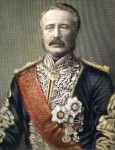
Gordon, Charles George
1833–1885 British general in Sudan General Charles George Gordon fought for Britain in Europe, Asia, and Africa. Killed defending the city of KHARTOUM in SUDAN, he was regarded by the British as a hero and a martyr. Born in Woolwich, near London, Gordon entered the military in 1852. He fought Britain's wars in various parts of the world, earning […]

Gordimer, Nadine
1923–2014 South African writer Nadine Gordimer, a prizewinning author, has written extensively about life in SOUTH AFRICA under APARTHEID—a policy of racial segregation followed from 1948 to 1994. Born in a white family in South Africa, Gordimer left school at the age of 10 for medical reasons. She was educated at home and in her local library. By the […]
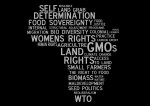
Global Politics and Africa
Global politics, or geopolitics, refers to the relationships and interactions among nations as they compete for power, influence, and economic resources. Since the 1600s the global politics of Africa have been marked by dependence on others. To a large extent, Africans have been under the control of outsiders from the time of the transatlantic SLAVE TRADE, to European colonial rule, […]
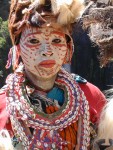
Gikuyu
Numbering well over 4 million people, the Gikuyu (also known as the Kikuyu) are the largest ethnic group in KENYA. They live in the high, fertile region between Mount Kenya and the capital city of NAIROBI. Their language, also called Gikuyu, is one of the Bantu languages. Traditionally, Gikuyu societies were based on farming, particularly millet and root crops, and […]
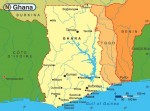
Republic of Ghana
POPULATION: 26.44 million (2014) AREA: 92,098 sq. mi. (238,534 sq. km) LANGUAGES: English (official); Dagbani, Ewe, Fante, Ga, Moshi-Dagomba NATIONAL CURRENCY: Cedi PRINCIPAL RELIGIONS: Traditional 38%, Muslim 30%, Christian 24%, Other 8% CITIES: Accra (capital), 1,673,000 (1999 est.); Kumasi, Tamale, Takoradi, Cape Coast, Tema, Sekondi ANNUAL RAINFALL: Varies from 29–39 in. (750–1,000 mm) in the southeast coastal savanna to 59–82 in. (1,500–2,100 mm) […]

Genocide and Violence
Genocide refers to the deliberate and systematic killing of an ethnic, racial, or religious group. In recent years Africa has had a tragic history of genocide and violence. Millions of lives have been lost in civil wars and other conflicts, while tens of millions of Africans have had to flee their homelands and live as refugees. The increase of […]
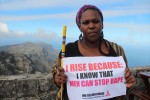
Gender Roles and Sexuality
Gender roles are the activities, responsibilities, and rights that a society considers normal and appropriate for men and women. There is no single model of gender roles in Africa. The continent's diverse cultures have many different ideas about male and female roles, although in general women have been subordinate to men in both public and family life. Like gender roles, […]

Garvey, Marcus Mosiah
1887–1940 Pan-African leader Marcus Mosiah Garvey played an important role in Pan-Africanism, a movement aimed at unifying blacks throughout the world in protest against racism and colonialism. At the time, most of Africa was controlled by European colonial powers. One of Garvey's greatest contributions was making the world aware of the problems that blacks in Africa faced under their rule. […]

Republic of the Gambia
POPULATION: 1.909 million (2014) AREA: 4,361 sq. mi. (11,295 sq. km) LANGUAGES: English (official); Mandinka, Wolof, Fula NATIONAL CURRENCY: Dalasi PRINCIPAL RELIGIONS: Muslim 90%, Christian 9%, Traditional 1% CITIES: Banjul (capital), 42,407 (1993 est.); Brikama, Basse, Bakua, Farafenni, Serekunda, Kuntaur, Bansang ANNUAL RAINFALL: 40 in. (1,016 mm) ECONOMY: GDP $807.1 million (2014) PRINCIPAL PRODUCTS AND EXPORTS: Agricultural: livestock, peanuts, rice, palm kernels, fish, […]
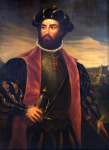
Gama, Vasco da
ca. 1460–1524 Portuguese navigator and discoverer Vasco da Gama discovered the route around Africa to India and changed the nature of trade between east and west. Bartolomeu Dias was the first European to sail around Africa's Cape of Good Hope and into the Indian Ocean. In 1497 the Portuguese ruler Manuel I sent Vasco da Gama on a voyage that […]
Galawdewos
ca. 1522–1559 Emperor of Ethiopia Galawdewos took the throne of ETHIOPIA in 1540. At the time much of the country was under the control of Ahmed Gran, leader of the Muslim kingdom of Adal. When a Portuguese expedition arrived in Ethiopia in 1541, Galawdewos formed an alliance with its leader, Cristovao da Gama, to fight the Muslims. Gran killed […]
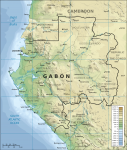
Gabon
POPULATION: 1.711 million (2014) AREA: 103,347 sq. mi. (267,658 sq. km) LANGUAGES: French (official); Fang, Mpongwe, Eshira NATIONAL CURRENCY: CFA franc PRINCIPAL RELIGIONS: Christian 60%, Traditional 40%, about 3,000 Muslims CITIES: Libreville (capital), 462,000 (1999 est.); Port-Gentil, Franceville, Lambarene ANNUAL RAINFALL: 100 in. (2,540 mm) on coast, 150 in. (3,810 mm) in interior ECONOMY: GDP $17.23 billion (2014) PRINCIPAL PRODUCTS AND EXPORTS: […]
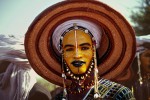
Fulani
Today one of the largest ethnic groups in West Africa, the Fulani (or Fulbe) were first recorded as living in the Senegal River valley and western GUINEA. In about the 1100s, they expanded eastward. The Fulani are now widely scattered, with large concentrations in NIGERIA, SENEGAL, Guinea, MALI, CAMEROON, and NIGER. In French-speaking areas they are known as Peul. The […]
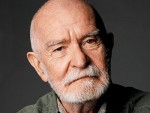
Fugard, Athol
1932– South African playwright Athol Fugard is one of Africa's best-known and most respected playwrights. His plays explore the personal suffering of individuals living under APARTHEID—the policy of racial segregation followed in SOUTH AFRICA from 1948 to 1994. Growing up in a poor white family placed Fugard in contact with the poor and oppressed black population of South Africa from […]
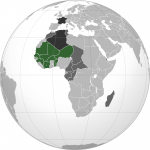
French West Africa
French West Africa was a federation of French colonies in West Africa that existed from 1895 until 1958. Created in stages, French West Africa eventually included eight colonies: SENEGAL, French Sudan (present-day MALI), GUINEA, IVORY COAST, Dahomey (present-day BENIN), Upper Volta (present-day BURKINA FASO), NIGER, and MAURITANIA. France established the federation to help coordinate French military efforts to dominate West Africa. […]
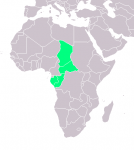
French Equatorial Africa
French Equatorial Africa was a French colony in the late 1800s and early 1900s, located in the area now occupied by the countries of CAMEROON, GABON, the CONGO (BRAZZAVILLE), the CENTRAL AFRICAN REPUBLIC, CHAD, and SUDAN. France administered the colony in a heavy-handed and inefficient manner. As a result, they did not get much benefit from their control over the […]
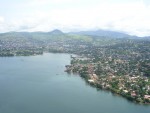
Freetown
Founded in 1787 as a colony for freed slaves, Freetown is the capital of SIERRA LEONE. It is also the country's chief port and largest city, with a population of about 500,000. Freetown's founders were British abolitionists, merchants, and bankers. They believed that the SLAVE TRADE could be replaced by other types of commerce and that Christianity could help repair […]
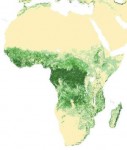
Forests and Forestry
Forests are one of Africa's most important natural resources, both for the influence they have in the continent's ecology and for their economic benefits. For thousands of years, the forests have provided habitats for a wide range of plants and animals. They have also served as a source of food, fuel, building materials, and trade goods for humans. Because of […]
Food and Drink
From the fish stew of Tunisia to the dried caterpillars of the Congo, African foods and eating customs vary according to the resources available. Religion and local custom have also played a role in determining diet. In many areas, traders and colonists from other continents introduced new foods and new ways of producing food. Throughout Africa the way people […]
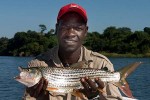
Fishing
In Africa fishing industries have long played a major role in commerce and in daily life. As early as the 1400s, dried, smoked, and salted fish were sold along trade routes that linked West Africa and the Sahel. By the 1500s commercial fishing was a significant industry. Fishing has also been a major source of food. Most Africans eat […]
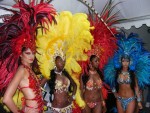
Festivals and Carnivals
Festivals and carnivals serve a multitude of social, religious, and political purposes. In Africa such events have been documented in travel books, museum displays, and studies of ethnic culture. Traditional celebrations also have been incorporated in dance and theater performances. Both scholars and the people who participate in festivals often view them as fixed traditions, handed down unchanged from generation to […]
Fasiladas
1632–1667 Emperor of Ethiopia Fasiladas stands out among historic emperors of ETHIOPIA because of his long reign and his impact on the country's political and religious policies. One of his first acts as emperor was to expel representatives of the Roman Catholic Church and to insist that only Ethiopian Orthodox Christianity could exist in his empire. Fasiladas founded a […]
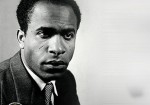
Fanon, Frantz
1925–1961 Algerian psychiatrist and theorist Born in the French West Indies, Frantz Fanon is considered one of the leading theorists of revolution of his time. After attending medical school in France, he served for three years as chief psychiatrist at a hospital in Blida, Algeria. Then he joined the National Liberation Front, a movement formed to free Algeria from French […]
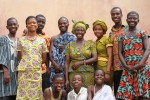
Family
Family plays a central role in African society. It shapes such daily experiences as how and where individuals live, how they interact with the people around them, and even, in some cases, whom they marry. It can determine a person's political identity and the way money and property are transferred. In rural areas, the family typically remains the basic unit […]
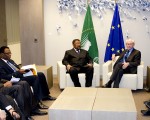
European Communities
Millions of Europeans live in communities scattered throughout Africa. Many of these communities date from the early decades of colonialism. In general, the numbers of European settlers in Africa gradually increased during the colonial period and then fell immediately after the colonies became independent nations. The population of SOUTH AFRICA includes more than 5 million Europeans, the largest community of Europeans […]
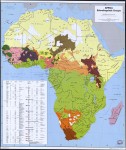
Ethnic Groups and Identity
Ethnic groups are populations that feel connected by a complex mix of kinship, culture, history, and geography. Together, the people in an ethnic group shape their ethnic identity—the sense of belonging to the group and sharing in its culture. Ethnic identity in Africa is as richly diverse as its people, and for most Africans it plays a central role in […]
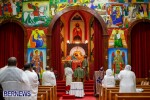
Ethiopian Orthodox Church
The Ethiopian Orthodox Church is the largest church in ETHIOPIA, with some 29 million members. The neighboring country of ERITREA has another 1.8 million members. This Christian church—also known by the name tewahido, meaning “unity”—separated from the Roman Catholic Church in A.D. 451 after the Council of Chalcedon. The council had declared that Jesus Christ had both a divine and […]
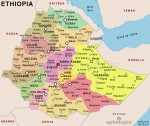
Federal Democratic Republic of Ethiopia
POPULATION: 96.51 million (2014) AREA: 435,184 sq. mi. (1,127,127 sq. km) LANGUAGES: Amharic (official); Gallinya, Tigrinya, Orominga, Somali, Italian, English NATIONAL CURRENCY: Birr PRINCIPAL RELIGIONS: Christian 40% (Ethiopian Orthodox), Muslim 45%, Traditional 15% CITIES: Addis Ababa (capital), 2,431,000 (1999 est.); Dessie, Dire Dawa, Harar, Gondar, Jimma, Mekele, Nazret ANNUAL RAINFALL: Varies from 104 in. (2,640 mm) in southwest to 4 in. (100 mm) in the […]
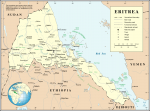
State of Eritrea
POPULATION: 6.536 million (2014) AREA: 46,774 sq. mi. (121,144 sq. km) LANGUAGES: Tigrinya (official); Afar, Arabic, Kunama, Tigre NATIONAL CURRENCY: Ethiopian birr PRINCIPAL RELIGIONS: Muslim 50%, Christian 50% (Coptic, Roman Catholic, Protestant) CITIES: Asmara (capital), 431,000 (1995 est.); Massawa, Assab, Keren, Agordat, Teseney, Adikwala, Addi Ugri ANNUAL RAINFALL: Varies from 18–29 in. (460–740 mm) in southern highlands to 12–14 in. (310–360 mm) in eastern […]
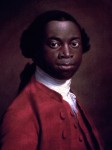
Equiano, Olaudah
ca. 1740s–1797 Abolitionist writer Olaudah Equiano, a former slave, became a forceful voice in the antislavery movement. His autobiography had considerable influence on British public opinion. Born in the kingdom of Benin to an IGBO family, Equiano was captured by slave traders at the age of ten. Later a British naval officer renamed him Gustavus Vassa and took him […]
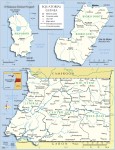
Republic of Equatorial Guinea
POPULATION: 778,100 (2014) AREA: 10,800 sq. mi. (27,972 sq. km) LANGUAGES: Spanish, French (both official); Bubi, Fang, Ibo, Ndowe NATIONAL CURRENCY: CFA Franc PRINCIPAL RELIGIONS: Christian (mostly Roman Catholic) 79%; Traditional 21% CITIES: Bata (capital), 24,100; Malabo, Luba, Moca, Nietang, Evinayong ANNUAL RAINFALL: 79 in. (2,000 mm) ECONOMY: GDP $14.31 billion (2014) PRINCIPAL PRODUCTS AND EXPORTS: Agricultural: cocoa, timber, coffee, bananas, fish, sweet […]
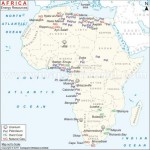
Energy and Energy Resources
Africa's resources include an abundant supply of petroleum, natural gas, and wood for fuel. The continent also has numerous rivers and waterfalls that could provide hydroelectric power. But Africans rely mostly on wood for energy. Most of the continent's other resources are expensive, available only in small quantities, and in limited areas. For a number of reasons, the development of […]
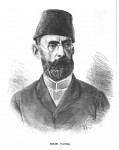
Emin Pasha
1840–1892 Explorer and colonial governor In the late 1800s, a European known as Emin Pasha became the object of a much-publicized rescue operation in Africa. During this time, the European powers were deeply involved in Africa. Emin, a provincial governor in the Egyptian colony of SUDAN, had been stranded by a religious war. Born Eduard Schnitzer in what is now […]
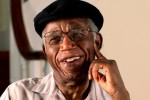
Ekwensi, Cyprian
1921–207 Nigerian writer Cyprian Ekwensi has won fame for his books about urban life in modern Africa. Born into an IGBO family in northern NIGERIA, he was educated at Ibadan University College in Nigeria and at the Chelsea School of Pharmacy in London. He spent his early career working in communications in the Nigerian civil service. Ekwensi turned to […]
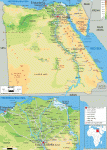
Arab Republic of Egypt
POPULATION: 83.39 million (2014) AREA: 386,200 sq. mi. (1,000,258 sq. km) LANGUAGES: Arabic (official); English, French NATIONAL CURRENCY: Egyptian Pound PRINCIPAL RELIGIONS: Muslim 94%, Coptic Christian 6% CITIES: Cairo (capital), 10,552,000 (2000 est.); Alexandria, Shubra El-Khemia, Giza, Aswan ANNUAL RAINFALL: Varies from 7 in. (178 mm) along the coast to virtually rainless along the Red Sea coastal plain and Western Desert. ECONOMY: GDP […]

Egypt, Ancient
The Egyptian civilization that arose along the banks of the NILE RIVER in ancient times was one of the longest-lasting in world history. For nearly 3,000 years, Egypt dominated the northeastern corner of Africa. The ancient Egyptians interacted with the peoples of the Near East and the Mediterranean. At the same time, they traded goods and maintained relations with groups […]
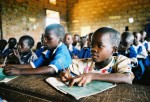
Education
In the modern world no country can hope to prosper and advance without an educated population. During most of the colonial period, Africa's black population was systematically denied access to quality schooling and higher education. After gaining independence, most African states made it a priority to strengthen their educational systems. That process has not always been smooth, and serious problems remain. […]
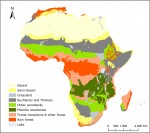
Ecosystems
An ecosystem is a closely woven web of plant and animal life within a particular type of physical environment. Africa has five main kinds of ecosystems: coastal environments, deserts and semideserts, mountain environments, savanna grasslands, and forests. Each ecosystem has its typical environment and climate, and the people who live there have adapted to its conditions and learned to use […]
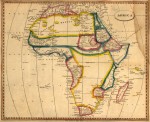
Economic History
Alack of written sources makes it difficult to trace the early economic history of much of the African continent, especially sub-Saharan Africa. What is clear is that Africans in precolonial times had basic economic activities that provided them with the things they needed to survive. At the same time, however, many factors limited the kind of intensive economic development […]
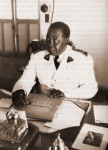
Eboue, Adolphe-Felix-Sylvestre
1884–1944 Colonial administrator Adolphe-Felix-Sylvestre Eboue was a Creole official who served France in a variety of colonial posts during the early 1900s. He is most famous for bringing several French colonies in Africa into World War II to fight on the side of the Allies. Born in French Guyana in South America, Eboue attended a school of colonial administration, […]
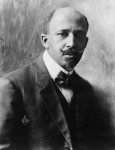
Du Bois, W.E.B.
1868–1963 Father of Pan-Africanism William Edward Burghardt Du Bois was a leading champion of equality for blacks in the United States and elsewhere. An African American born in Massachusetts, Du Bois attended college and earned a Ph.D. degree from Harvard University. In the early 1900s, he became a black civil rights leader. Du Bois was known for his view […]
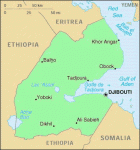
Republic of Djibouti
POPULATION: 886,300 (2014) AREA: 8,500 sq. mi. (22,000 sq. km) LANGUAGES: French, Arabic (both official); Afar, Somali NATIONAL CURRENCY: Djibouti Franc PRINCIPAL RELIGIONS: Muslim 94%, Christian 6% CITIES: Djibouti (capital), 383,000 (1999 est.); Ali Sabieth, Dikhil, Tadjoura, Obock ANNUAL RAINFALL: Less than 5 in. (127 mm) ECONOMY: GDP $1.582 billion (2014) PRINCIPAL PRODUCTS AND EXPORTS: Agricultural: goats, sheep, camels, cattle, coffee Manufacturing: […]
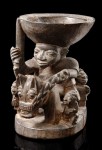
Divination and Oracles
Throughout much of Africa people turn to divination for guidance in resolving their troubles. The act of divination involves advice, an explanation, or a prediction for the future—all of which are considered messages from the spiritual world. Many Christian and Muslim Africans do not see divination as conflicting with their faiths. Their approach to understanding life and solving its problems […]

Diseases
Poverty and the scarcity of adequate health services have combined to make disease a particularly severe problem throughout Africa. Africans have to deal with many of the same illnesses that affect people in other parts of the world. They suffer from infectious diseases such as measles, lifestyle-related illnesses such as cancer and heart disease, and sexually transmitted diseases (STDs). However, […]
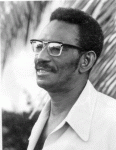
Diop, Cheikh Anta
1923–1986 African scholar and political leader Cheikh Anta Diop was an accomplished historian, physicist, archaeologist, and linguist who championed the cause of African independence and explored the roots of African culture and civilization. Born to a Muslim family in SENEGAL and educated in both Africa and France, Diop had an unusual background from which to examine Africa's colonial experience. While doing […]
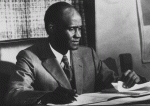
Diop, Alioune
1910–1980 Writer and cultural leader The Senegalese writer Alioune Diop played a major role in changing the way the French-speaking world viewed Africa. Born and educated in SENEGAL, Diop worked as a professor and represented the colony in the French Senate. In 1947 he started Presence africaine, which became the most influential French-language journal on Africa. In Presence africaine, […]

Dingiswayo
1770s–1816 Chief of the Nguni confederation Dingiswayo was the last chief of the Nguni confederation of southern Africa before Europeans colonized the area. According to legend, Dingiswayo became chief by killing his brother because he believed that his brother was not the rightful ruler. After assuming power, Dingiswayo combined several related kingdoms into a unified confederation. He then appointed subchiefs from […]
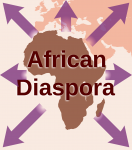
Diaspora, African
Today, Africans and their descendants are found on every inhabited continent. African traditions have influenced religion and art, and popular music the world over owes much to African rhythms and musical styles. This global presence is due largely to the African diaspora—a movement of people of African descent to areas outside their homeland. The story of the African diaspora […]